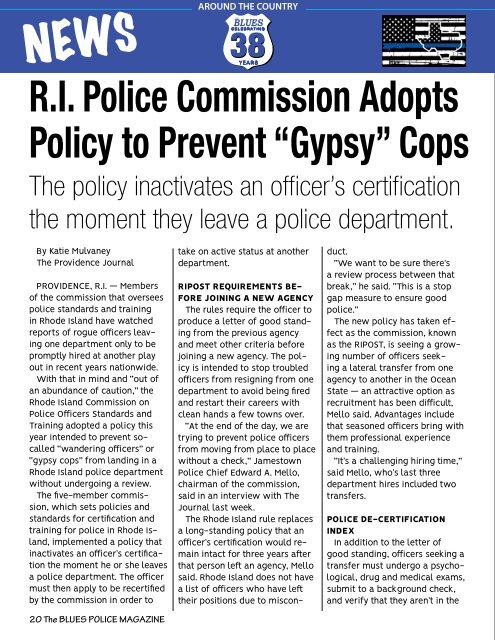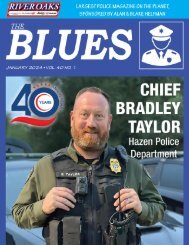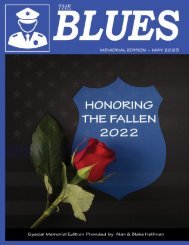Jan 2022. Blues Vol 38 No. 1
Jan 2022. Blues Vol 38 No. 1 FEATURE STORIES • New Year Resolutions for 2022 • Remembering Those We’ve Lost to COVID • Remembering Those We’ve Lost to LOD Deaths • Feature Story: They Didn’t Make it • Special Memorial Insert - Officers we Lost in 2021 DEPARTMENTS • Publisher’s Thoughts • Editor’s Thoughts • Your Thoughts • News Around the US • War Stories • Aftermath • Open Road - NYPD Orders Mustang E’s • Healing Our Heroes • Daryl’s Deliberations • HPOU - From the President, Douglas Griffith • Light Bulb Award • Running 4 Heroes • Blue Mental Health with Tina Jaeckle • Off Duty with Rusty Barron • Ads Back in the Day • Parting Shots • Now Hiring - L.E.O. Positions Open in Texas • Back Page - Meet the Commish
Jan 2022. Blues Vol 38 No. 1
FEATURE STORIES
• New Year Resolutions for 2022
• Remembering Those We’ve Lost to COVID
• Remembering Those We’ve Lost to LOD Deaths
• Feature Story: They Didn’t Make it
• Special Memorial Insert - Officers we Lost in 2021
DEPARTMENTS
• Publisher’s Thoughts
• Editor’s Thoughts
• Your Thoughts
• News Around the US
• War Stories
• Aftermath
• Open Road - NYPD Orders Mustang E’s
• Healing Our Heroes
• Daryl’s Deliberations
• HPOU - From the President, Douglas Griffith
• Light Bulb Award
• Running 4 Heroes
• Blue Mental Health with Tina Jaeckle
• Off Duty with Rusty Barron
• Ads Back in the Day
• Parting Shots
• Now Hiring - L.E.O. Positions Open in Texas
• Back Page - Meet the Commish
You also want an ePaper? Increase the reach of your titles
YUMPU automatically turns print PDFs into web optimized ePapers that Google loves.
AROUND THE COUNTRY<br />
R.I. Police Commission Adopts<br />
Policy to Prevent “Gypsy” Cops<br />
The policy inactivates an officer’s certification<br />
the moment they leave a police department.<br />
By Katie Mulvaney<br />
The Providence Journal<br />
PROVIDENCE, R.I. — Members<br />
of the commission that oversees<br />
police standards and training<br />
in Rhode Island have watched<br />
reports of rogue officers leaving<br />
one department only to be<br />
promptly hired at another play<br />
out in recent years nationwide.<br />
With that in mind and “out of<br />
an abundance of caution,” the<br />
Rhode Island Commission on<br />
Police Officers Standards and<br />
Training adopted a policy this<br />
year intended to prevent socalled<br />
“wandering officers” or<br />
“gypsy cops” from landing in a<br />
Rhode Island police department<br />
without undergoing a review.<br />
The five-member commission,<br />
which sets policies and<br />
standards for certification and<br />
training for police in Rhode Island,<br />
implemented a policy that<br />
inactivates an officer’s certification<br />
the moment he or she leaves<br />
a police department. The officer<br />
must then apply to be recertified<br />
by the commission in order to<br />
take on active status at another<br />
department.<br />
RIPOST REQUIREMENTS BE-<br />
FORE JOINING A NEW AGENCY<br />
The rules require the officer to<br />
produce a letter of good standing<br />
from the previous agency<br />
and meet other criteria before<br />
joining a new agency. The policy<br />
is intended to stop troubled<br />
officers from resigning from one<br />
department to avoid being fired<br />
and restart their careers with<br />
clean hands a few towns over.<br />
“At the end of the day, we are<br />
trying to prevent police officers<br />
from moving from place to place<br />
without a check,” Jamestown<br />
Police Chief Edward A. Mello,<br />
chairman of the commission,<br />
said in an interview with The<br />
Journal last week.<br />
The Rhode Island rule replaces<br />
a long-standing policy that an<br />
officer’s certification would remain<br />
intact for three years after<br />
that person left an agency, Mello<br />
said. Rhode Island does not have<br />
a list of officers who have left<br />
their positions due to misconduct.<br />
“We want to be sure there’s<br />
a review process between that<br />
break,” he said. “This is a stop<br />
gap measure to ensure good<br />
police.”<br />
The new policy has taken effect<br />
as the commission, known<br />
as the RIPOST, is seeing a growing<br />
number of officers seeking<br />
a lateral transfer from one<br />
agency to another in the Ocean<br />
State — an attractive option as<br />
recruitment has been difficult,<br />
Mello said. Advantages include<br />
that seasoned officers bring with<br />
them professional experience<br />
and training.<br />
“It’s a challenging hiring time,”<br />
said Mello, who’s last three<br />
department hires included two<br />
transfers.<br />
POLICE DE-CERTIFICATION<br />
INDEX<br />
In addition to the letter of<br />
good standing, officers seeking a<br />
transfer must undergo a psychological,<br />
drug and medical exams,<br />
submit to a background check,<br />
and verify that they aren’t in the<br />
National De-certification Index, a<br />
national registry of certificate or<br />
license revocation actions relating<br />
to officer misconduct.<br />
The index, which police in<br />
Rhode Island use to vet outof-state<br />
applicants, currently<br />
lists 31,000 disciplinary actions,<br />
according to Michael Becar,<br />
executive director of the International<br />
Association of Directors<br />
of Law Enforcement Standards<br />
& Training, which oversees the<br />
database.<br />
Although Rhode Island’s new<br />
policy inactivates an officer’s<br />
certification, that individual’s<br />
name cannot be added to the index<br />
because it is not a de-certification<br />
due to misconduct, Becar<br />
said. Rhode Island does not have<br />
a list of officers who have left<br />
their positions due to misconduct,<br />
according to Mello.<br />
Rhode Island is one of four<br />
states nationally whose standards<br />
and training commission<br />
doesn’t have the authority under<br />
state law to decertify a police<br />
officer, a process that essentially<br />
strips that person of his or her<br />
badge.<br />
It joins New Jersey, Hawaii, and<br />
California, though state lawmakers<br />
there passed a measure<br />
in September empowering that<br />
state to suspend or revoke a<br />
certificate on specified grounds.<br />
Those include the use of excessive<br />
force, sexual assault, making<br />
a false arrest, or participating<br />
in a law enforcement gang, as<br />
well as demonstrating an abuse<br />
of power or bias based on race,<br />
national origin, religion, gender<br />
identity or sexual orientation,<br />
or disability. The California law<br />
takes effect in <strong>Jan</strong>uary.<br />
From Becar’s perspective, it<br />
is important for the RIPOST to<br />
have the authority to de-certify<br />
problematic officers to prevent<br />
misconduct and an unwitting<br />
agency experiencing a black eye<br />
and civil liability due to officer<br />
misdeeds.<br />
“They need the authority to<br />
investigate officers who have<br />
committed misconduct, to terminate<br />
their license,” Becar said.<br />
“If they don’t have the authority,<br />
there’s nothing to stop that officer<br />
from going from agency to<br />
agency.”<br />
The association recommends<br />
as model de-certification policies<br />
that incorporate an independent<br />
investigation by the commission<br />
and an appeal process,<br />
as seen in Arizona and Oregon.<br />
“It’s a very fair hearing into<br />
whether misconduct occurred,”<br />
Becar said.<br />
But to Mello, de-certification<br />
can only work if every state is<br />
empowered to revoke an officer’s<br />
badge and then ensure the misconduct<br />
is entered into the national<br />
database. The states must<br />
require, too, that each department<br />
check that database before<br />
hiring an officer, he said.<br />
“There’s no point in de-certification<br />
unless every state is<br />
de-certifying,” Mello said<br />
‘A STEP IN THE RIGHT DIRECTION’<br />
For now, Sid Wordell, executive<br />
director of the Rhode Island Police<br />
Chiefs’ Association, says the<br />
new policy “is a step in the right<br />
direction.”<br />
“Ultimately, everybody believes<br />
there should be a de-certification<br />
process,” Wordell said.<br />
Harrison Tuttle, executive director<br />
of BLM RI PAC, agrees that<br />
the policy represents a step in<br />
the right direction.<br />
“While we celebrate this victory<br />
today, tomorrow we go back<br />
to work,” Tuttle, who is running<br />
for General Assembly, said in an<br />
email.<br />
The BLM RI PAC will stand<br />
with the state’s Black and brown<br />
communities and continue to<br />
call for the repeal of the Law Enforcement<br />
Officers’ Bill of Rights<br />
in Rhode Island, he said. He welcomed<br />
the chance to meet with<br />
the Police Chiefs’ Association “to<br />
do a full analysis on how this<br />
policy change works in practice<br />
... as we plan to hold them accountable.”<br />
Legislation to amend the Law<br />
Enforcement Officers Bill of<br />
Rights failed to pass last session<br />
after advocates, interest groups<br />
and lawmakers were unable to<br />
reach agreement on key details.<br />
©2021 www.providencejournal.com.<br />
Visit providencejournal.<br />
com. Distributed by Tribune Con-<br />
SEND YOUR DEPARTMENT’S<br />
NEWS STORIES TO:<br />
bluespdmag@gmail.com<br />
FREE SUBSCRIPTION<br />
CLICK HERE<br />
20 The BLUES POLICE MAGAZINE The BLUES POLICE MAGAZINE 21


















